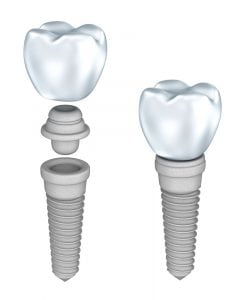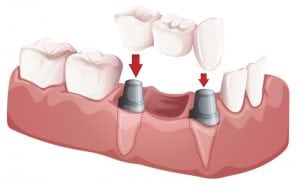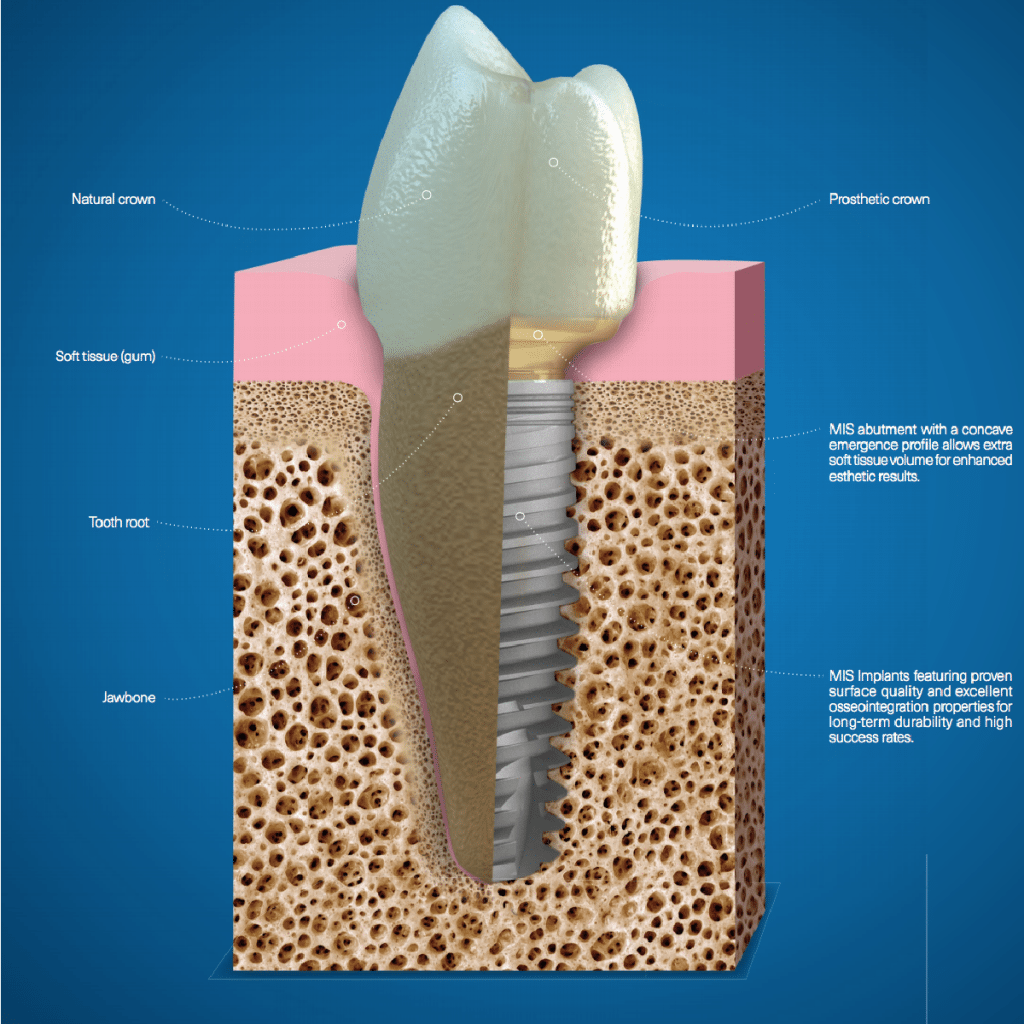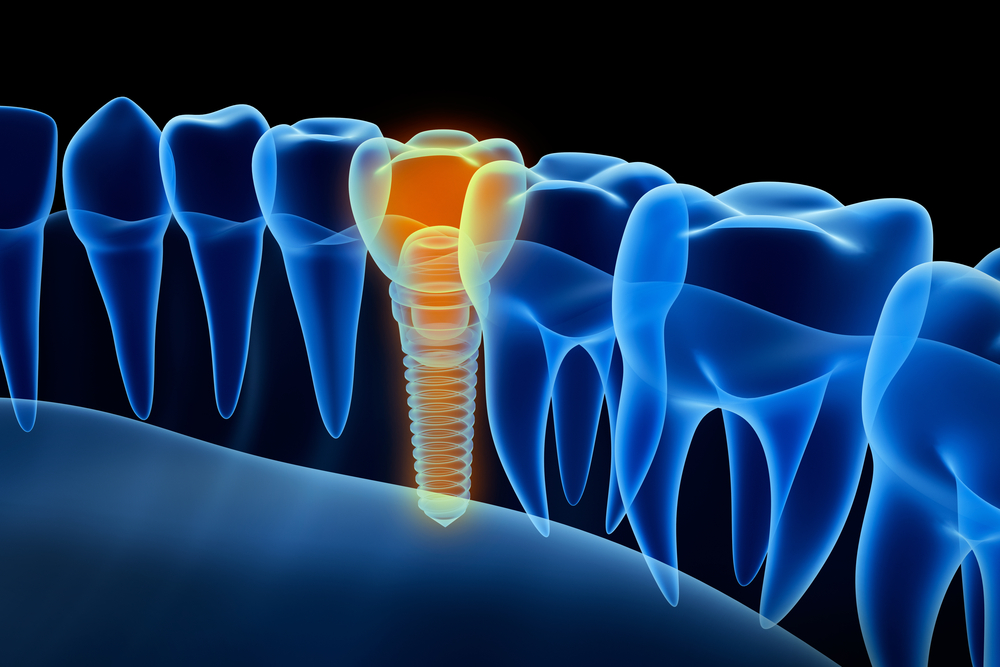Dental implants are considered to be the most effective way to replace your missing teeth
In experienced hands, the surgery for dental implants is a safe, controlled and relatively straightforward procedure. Frankly, a lost tooth is bad news and it pays to act quickly to fill the space.
The goal of dental implants is to allow patients to regain not only the aesthetics of their smile, but to restore the function of their teeth. They can replace one tooth, several teeth or all of your teeth.
Dental implants are an ideal replacement option for patients who have lost teeth due to injury, decay or gum disease and still have good oral health. Dental implants have many advantages, some of which include:
- They look, feel and function like a natural tooth
- Dental Implants don’t rely on your neighbouring teeth for support
- The implant won’t decay or acquire cavities
- Dental implants can often last a lifetime
- They protect the surrounding healthy bone
- Dental implants stay in place
- Dental implants are a predictable, and safe option
Image source: http://www.mis-implants.com/International/AU.aspx
Your Dental Implants Options
At Northshore Dental and Oral Health, we offer four different dental implant options. These include single:
- Single tooth implants
- Fixed bridge, multiple teeth replacement
- Implant retained dentures
- Full arch retained implants to replace all the upper or lower teeth
Today, dental implants are one of the most innovative and effective restorations. They allow patients to recover the function and form of their smiles.

By replacing a gap in your smile with an implant crown, it can not only benefit you aesthetically; but also restore many functions a natural tooth can.
The benefits of replacing a missing tooth with an implant is that they can:
- Stop your other teeth from moving into the space – causing crowding
- Restore your chewing abilities
- Re-establish your speaking abilities
- Reduce the risk of bone loss
- Stop occlusion (the manner in which the upper and lower teeth come together) being disturbed
- Stabilise the dental prosthetic placed on top
A bridge is a dental restoration that is created using several dental crowns, which are fused together. They can literally ‘bridge’ the gap left by  missing teeth. By inserting dental implants into the main area of tooth loss, Dr Nick Taft can accurately attach the bridgework onto the stable implants.
missing teeth. By inserting dental implants into the main area of tooth loss, Dr Nick Taft can accurately attach the bridgework onto the stable implants.
Once the implants have fused with the jawbone, they will mimic the function of a natural tooth root.
One significant advantage of implants over traditional bridgework is the adjacent teeth will remain unaffected by this treatment. Conventional bridgework requires reduction of the adjacent teeth, which can often reduce the inner stability of a tooth.
With this dental implant treatment, the overdenture is secured directly onto the implants that were placed into your upper and lower jaw. This overdenture can only be removed by a dentist and gives the patient the closest resemblance to natural teeth, gums and smile.
This restoration is commonly known as all on 4, 6 or 8 dental implants. The full arch bridge is used when all the teeth are lost in the upper or lower jaw. It’s an ideal solution that was developed to maximise the use of available bone. This treatment is suitable for almost all patients of all ages, stages of teeth loss and if bone tissue is decayed.
The two components of this treatment include:
- The implants are implanted in specific locations to create a 3D trapezoid force that will enable the attachment of a full arch metal ceramic bridge containing 12 or 14 teeth.
- A metal-ceramic bridge will be created a metal substructure to support the ceramic teeth. The same metal is used to create dental crowns and is the best implant supported bridge available today for replacing all teeth in a jaw.

Image source: http://www.mis-implants.com/International/AU.aspx
These implants are a cost saving option to traditional implants thanks to their lightweight design, biocompatible material and surface morphology, which was shaped by sandblasting. These versatile implants can be used to restore single crowns, anterior cemented bridges and even full dentures.
A lot of Dr Taft’s patients who have lost their natural smiles who utilise full, lower dentures can often have trouble eating and talking. With no natural teeth to hold and stabilise the dentures, they can become loose and cause discomfort.
Placement of two dental implants in the lower jaw can be a cost effective way to solve this problem. These implants engage clips inside the denture, which will hold them firmly in place, and the denture can still be removed for cleaning.
Dental implants as we know them today were invented in 1952 by Per-Ingvar Branemark, a Swedish orthopaedic surgeon. Fast-forward to today, and they have now set the benchmark for premium dental care.
Dental implants are essentially artificial tooth roots implanted into your jaw. They are securely anchored into your jaw and are made from a biocompatible medical grade titanium.
Because dental implants will fuse to your jaw bone, when the dentists at Northshore Dental and Oral Health mount dental crowns, bridges or dentures on top, they won’t slip or shift around your mouth.
Many patients get dental implants to replace their missing teeth that have been removed for a number of reasons. Dental implant patients are from all ages, and may be the right choice one missing tooth, multiple missing teeth, or even all of their teeth due to injury, defects, disease or decay.
Teeth on either side of the gap can start to shift and in severe cases, the drifting of these teeth can result in occlusion (the manner in which the upper and lower teeth come together) being disturbed.
Another issue that can arise from missing teeth is your ability to bite and chew. When you’re missing one tooth, you still have the same amount of load coming from your jaw muscles when you chew. This load will then be spread over fewer teeth, meaning that the remaining teeth are under more stress and are more likely to break, wear down or become loose.
Northshore Dental and Oral Health can treat teeth deteriorated by decay, inherited conditions, trauma or simply worn down by your everyday lifestyle.
Factors that affect how long a dental implant will last will depend on the patient’s lifestyle and dental hygiene. With the advanced technology, failures due to reaction or functionality are considered rare.
Implants at the back of the mouth receive more strain from chewing which will cause them to fail before the implants near the front of the mouth. With proper care however, the implant can last a lifetime.
An ideal candidate for dental implants will be in good general and oral health. Candidates need a good amount of bone in order to place the implant. They will also need healthy gum tissue.
If however, your dentist doesn’t think there is enough jawbone to hold the implant, a bone graft procedure can be performed.
Northshore dental and Oral Health have made paying for dental procedures easy and affordable. We offer our patients many ways to pay and have incorporated a HICAPS machine for easy private health fund rebates.
We also offer payment plans so you can get the dental treatment you need now, not later.
For more information on dental implants or our payment options, contact our friendly team today or call us on ph. (07) 5448 7849
Northshore Dental and Oral Health makes smiling stress free
For more information on dental implants, or to find out if you’re a candidate, contact the dentists at Northshore Dental and Oral Health today.
We take the burden out of bills. For all our services we offer a range of payment plans including zipMoney MediPlan, GE Finance and also an in-house payment plan to ensure patients get high-class dental care when they need it. We also employ credit card facilities and have integrated a HICAPS machine meaning you get your private health rebate back on the spot, quickly and conveniently.


